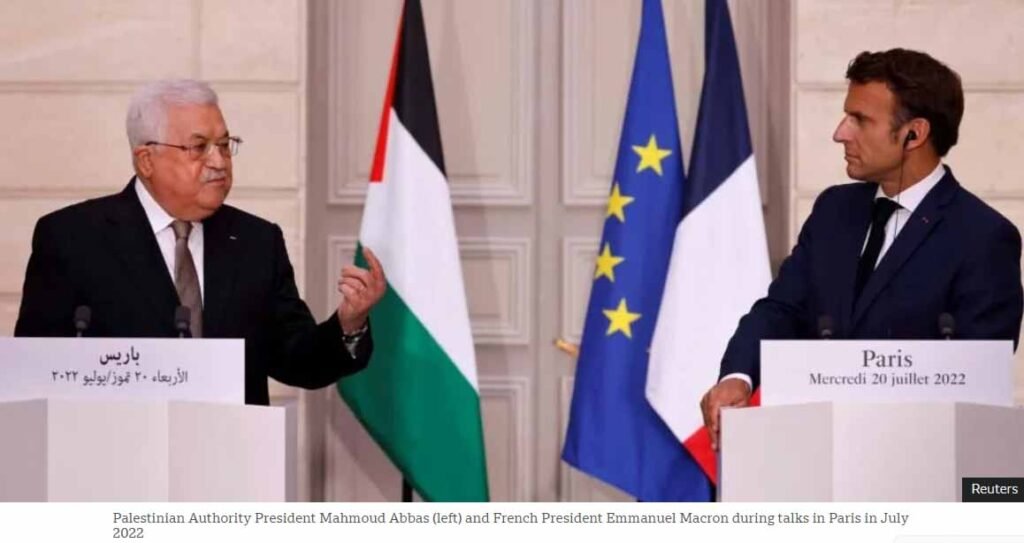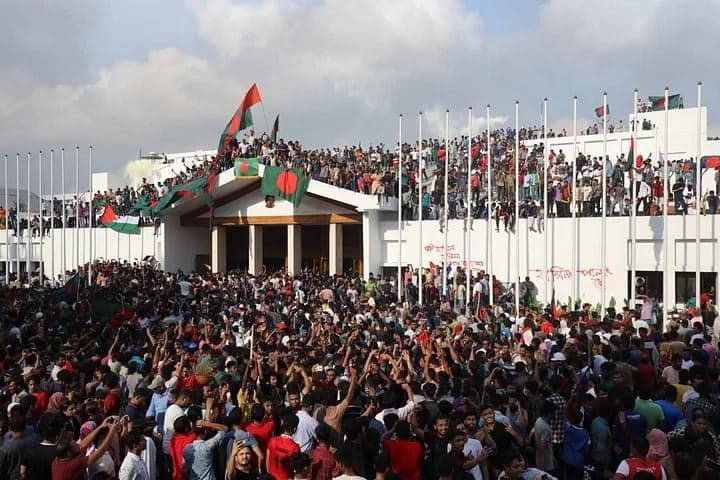Historic move signals France’s commitment to a two-state solution
Paris, July 24, 2025 — French President Emmanuel Macron announced on Wednesday that France will officially recognize the State of Palestine during the upcoming United Nations General Assembly in September. The move, described by Macron as “a matter of justice and peace,” would make France the first G7 nation to formally recognize Palestinian statehood.

The announcement was made in a letter addressed to Palestinian President Mahmoud Abbas and is being seen as a major shift in France’s Middle East policy. Macron emphasized that the decision reflects a long-standing French commitment to the two-state solution, which envisions Israel and Palestine existing side by side in peace and security.
“The recognition of a Palestinian state is not a favor to anyone. It is an act of justice, a step toward peace, and a reaffirmation of international law,” Macron stated.
A Long-Awaited Diplomatic Step
While over 140 countries have already recognized Palestine as a state, France’s formal recognition carries significant weight as a permanent member of the UN Security Council and one of Europe’s key powers. Macron’s decision aligns with a broader European push to revisit long-stalled peace negotiations between Israel and the Palestinians.
This announcement comes after several European nations, including Spain, Ireland, Norway, and Slovenia, extended official recognition earlier in 2025. The French president had hinted for months that recognition was imminent, stating previously that the right moment would be “when it can have the greatest impact in support of peace.”
Mixed International Reactions
The Palestinian Authority has welcomed the move, calling it a vital step toward restoring hope in the prospect of statehood and international legitimacy. Palestinian officials urged other major powers to follow France’s example and use September’s UN platform to support Palestinian self-determination.
However, the announcement drew swift criticism from the Israeli government, with Prime Minister Benjamin Netanyahu denouncing the move as “a reward for terrorism.” Israeli officials argue that such recognition undermines direct negotiations and emboldens militant groups.
Despite these objections, Macron reaffirmed France’s condemnation of terrorism and emphasized that recognition must go hand-in-hand with the demilitarization of Hamas, the release of hostages, and an immediate cease-fire in Gaza.
France’s Vision for Peace
Macron has repeatedly emphasized that the recognition of Palestine is not intended as a provocation, but as a catalyst for peace. He framed the decision within France’s broader diplomatic agenda: to help create conditions for renewed negotiations, address the humanitarian crisis in Gaza, and encourage regional actors to pursue normalization with Israel.
According to the French government, the September recognition will be accompanied by a diplomatic push at the UN and through bilateral discussions, including postponed talks with Saudi Arabia and other Arab states.
“France will not stand idle while the conflict deepens and peace remains elusive,” Macron said. “We believe recognition is a necessary foundation, not a final answer.”
What’s Next?
The recognition scheduled for September 2025 at the United Nations is expected to spark renewed international attention on the Israeli–Palestinian conflict. Observers say France’s move could pressure other Western democracies—such as the United Kingdom, Germany, Canada, and even the United States—to re-evaluate their positions.
In the lead-up to the UN General Assembly, France is expected to hold consultations with European and Middle Eastern allies to coordinate a broader diplomatic strategy. A postponed New York Peace Conference, originally set for July, may be rescheduled in the coming weeks to complement this initiative.
Summary
- France will formally recognize the State of Palestine at the UN General Assembly in September 2025.
- President Macron calls the decision a step toward justice, peace, and international law.
- Palestinian leaders welcome the move; Israel strongly objects, citing security concerns.
- France reiterates support for a two-state solution, a cease-fire, and the demilitarization of Hamas.
- The decision positions France as a leading voice in reshaping the international approach to Middle East peace.
As global leaders prepare for a pivotal UN gathering, France’s bold diplomatic step may redefine the contours of international engagement with the Israeli–Palestinian conflict—and breathe new life into efforts for a lasting resolution.

